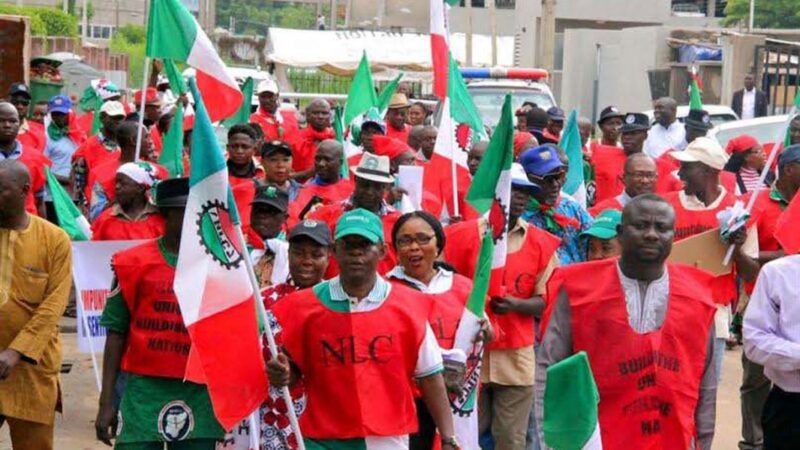Breaking News
Workers’ Compensation Controversy: FG Backs Down as NLC Holds Ground
With pressure mounting from labour groups, employers, and civil society, the Federal Government faces growing scrutiny over its handling of workers’ funds. While a partial reversal of the NSITF deductions may cool tensions, the unresolved issues surrounding PenCom’s governance and the future of social insurance protections could reignite labour unrest if not swiftly addressed.

• NSITF assures no further deductions, AGF pledges refund
• Labour demands immediate restoration of PenCom Board
The Federal Government has moved to reverse controversial deductions from the Employees’ Compensation Scheme managed by the Nigeria Social Insurance Trust Fund (NSITF), in a bid to avert a looming nationwide strike by the Nigeria Labour Congress (NLC).
The decision follows NLC’s accusation that the government diverted 40% of NSITF contributions into the federal treasury — a move the union says compromises workers’ social protection. The NLC is demanding an immediate refund and the reconstitution of the National Pension Commission (PenCom) Board, warning that failure to comply could lead to industrial action.
FG’s Deduction Policy Sparks Outrage
In a letter dated August 16, 2025, NSITF Managing Director Oluwaseun Faleye confirmed that deductions were made but claimed they were not diversions. The deductions, he explained, followed a December 2023 directive from the Federal Ministry of Finance, mandating 50% remittance of internally generated revenue (IGR) from all government-owned enterprises to the treasury.
“Recall that the Federal Ministry of Finance circular (Ref: FMFCME/OTHERS/IGR/CFR/21/2021) dated December 28, 2023, introduced a policy of automatic deduction of 50 per cent from the internally generated revenue of all Federal Government-owned enterprises,” Faleye wrote.
He noted that contributions from employers — which fund the Employees’ Compensation Scheme — are not government revenue and should not have been subject to such deductions. Following a March 2024 directive from the Accountant-General of the Federation, these deductions have been halted and partially reversed.
“We have been assured that this matter will be addressed. Both the Minister of Finance and the Director-General of the Budget Office…committed that no further deductions would be made,” the NSITF assured.
Faleye added that while employer contributions are no longer deducted, investment income generated from those contributions is still affected — a matter NSITF is actively negotiating with federal authorities.
NLC: Workers’ Funds Are Not Government Revenue
Christopher Onyeka, NLC’s Assistant General Secretary, said the union had received NSITF’s response and would review it internally before making a decision on the planned strike.
He emphasized that NSITF is a tripartite agency jointly owned by workers, employers, and the government — not a revenue-generating body.
“The contributions to NSITF are intended to compensate workers in the event of injury. They are not government revenue and should not be used for fiscal purposes,” Onyeka said.
“Depleting these funds would compromise the agency’s ability to support workers… It is anomalous for the Ministry of Finance to classify NSITF as a revenue-generating entity.”
The NLC stressed that the deductions began under the current administration, and warned that the union would not back down from its demand to protect workers’ rights.
NSITF Denies Weakening Compensation Act
Responding to concerns that NSITF was attempting to amend the Employees’ Compensation Act (ECA) in a way that would undermine workers’ rights, Faleye stated that the agency’s proposals are intended to improve enforcement and strengthen compliance.
“We have made suggestions to the National Assembly aimed at enhancing compliance with the Employees’ Compensation Scheme,” he explained.
He said the NSITF is not empowered to make or stop laws, but will engage the amendment process when it reaches the stakeholders’ engagement phase.
PenCom Board: Labour Demands Full Reconstitution
The NLC also renewed its call for the immediate constitution of the PenCom Governing Board, which was dissolved on June 16, 2023, alongside other federal boards. While PenCom’s Director-General, Omolola Oloworaran, was appointed and confirmed in 2024, the Chairman and four full-time Commissioners remain unnamed.
“The non-constitution of the PenCom Board contravenes the PenCom Act… It allows the government to unilaterally control pension funds, stripping away statutory oversight,” the NLC warned.
According to the Pension Reform Act 2014, the PenCom Board must include 16 members, with representatives from labour unions, pensioners, employers, and financial regulators. The NLC argues that leaving the board incomplete opens the door to mismanagement and political interference.
Experts Weigh In
Ivor Takor, Director of the Centre for Pension Rights Advocacy, supported NLC’s concerns, stating:
“The NLC’s call for the prompt reconstitution of the board is consistent with the Pension Reform Act 2014.”
He clarified that while NLC’s demand for direct access to pension fund reports is not backed by law, their concerns about governance gaps are valid.
Consumer rights advocate, Moses Igbrude, urged dialogue over disruption:
“Everything is not about strikes. Both parties should meet, table issues, and agree before escalation.”
Employers, NECA Align with Labour
The Nigeria Employers’ Consultative Association (NECA) backed the NLC’s demand for the reconstitution of the PenCom Board.
“Not constituting the board is a violation of the Act,” said NECA Director-General, Adewale-Smatt Oyerinde. “Since this government claims to respect due process, it should take this step.”
FG, PenCom Insist Funds Are Safe
Despite the tension, NSITF and PenCom both maintain that workers’ funds are secure and traceable.
“Every contribution is accounted for. The integrity of the Employees’ Compensation Scheme is intact,” NSITF stated.
Ibrahim Buwal, Head of Corporate Communications at PenCom, reassured the public:
“Nobody’s money is missing. There are no pension funds under the CPS that are unaccounted for.”
He noted that contributors receive regular statements, and all reports are published as required by law.
Conclusion
With pressure mounting from labour groups, employers, and civil society, the Federal Government faces growing scrutiny over its handling of workers’ funds. While a partial reversal of the NSITF deductions may cool tensions, the unresolved issues surrounding PenCom’s governance and the future of social insurance protections could reignite labour unrest if not swiftly addressed.










